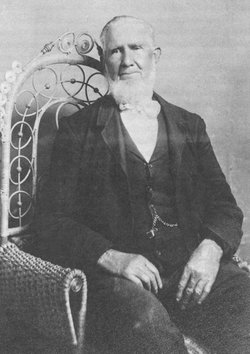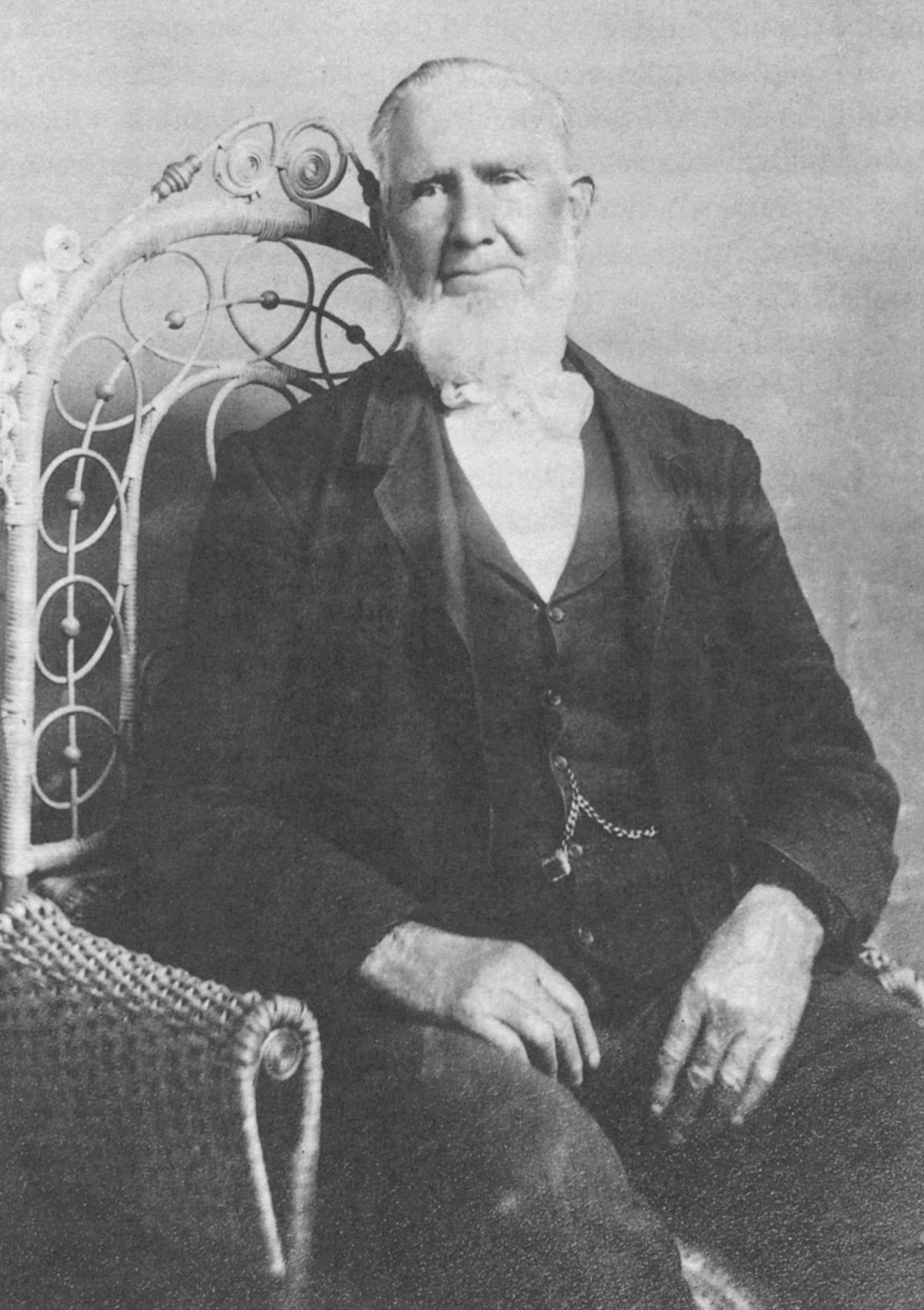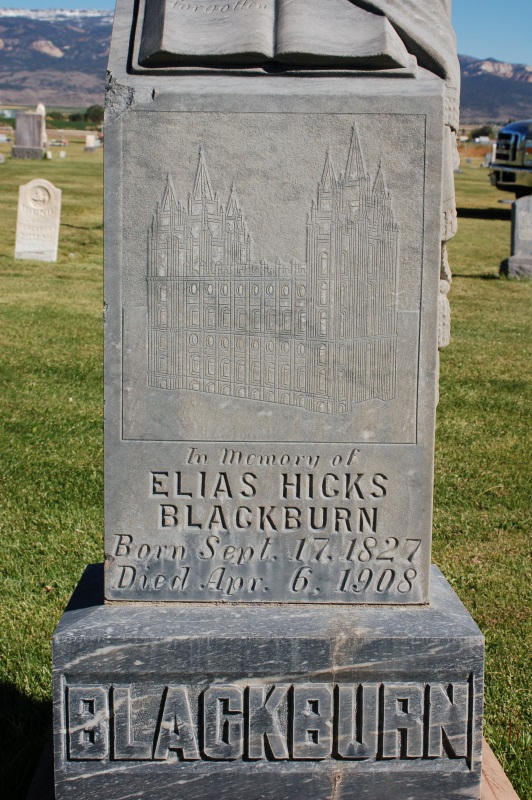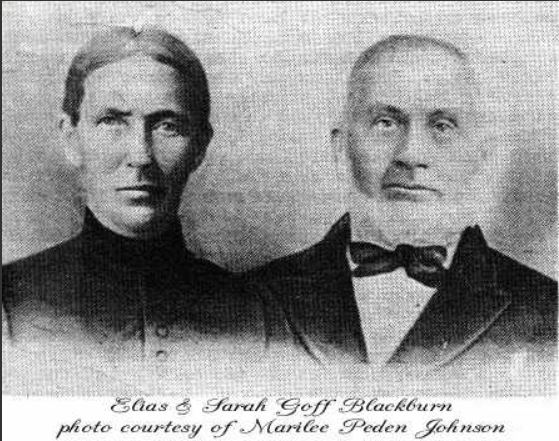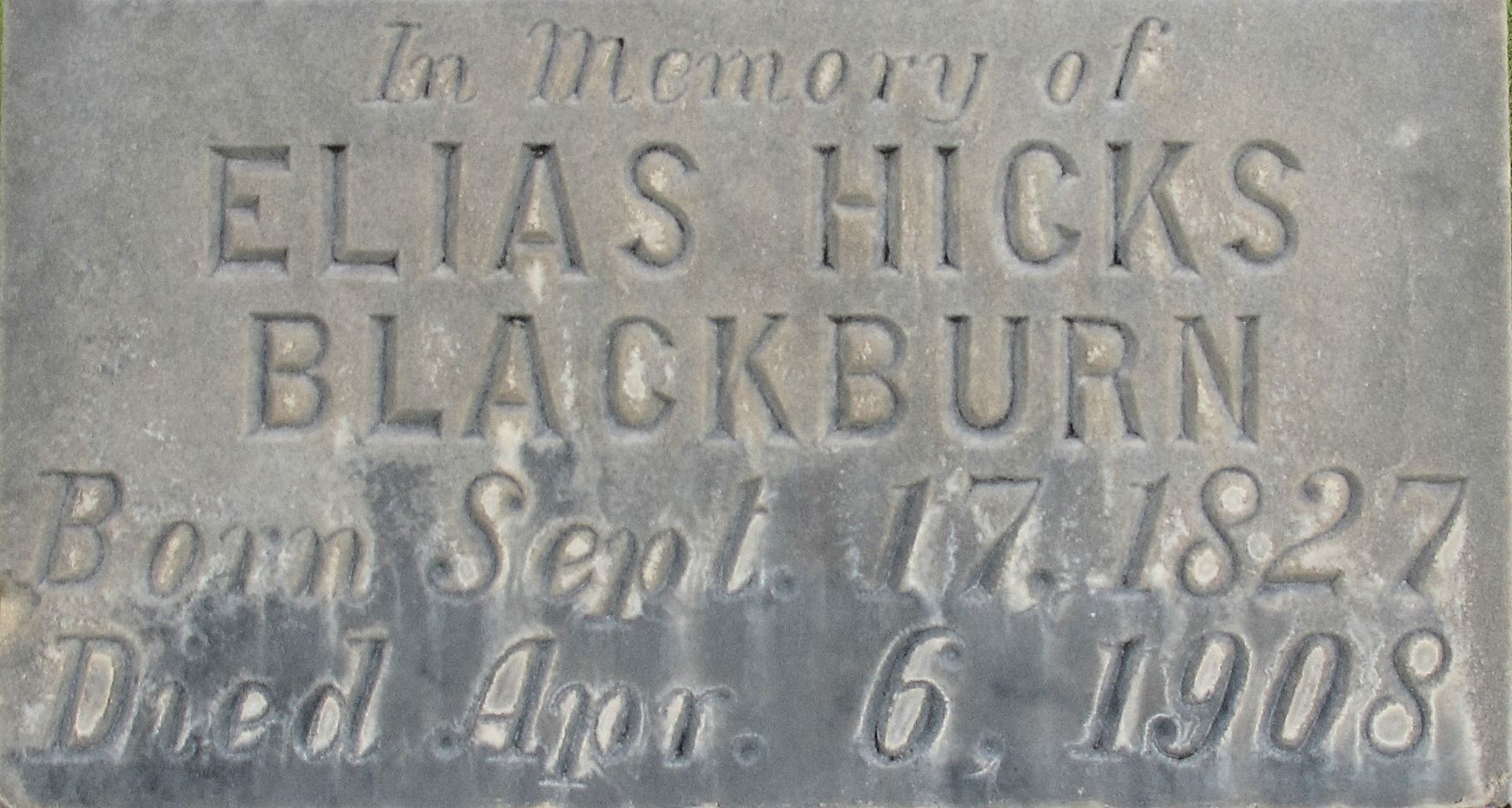Married Sarah Jane Goff, 3 Mar 1847, Council Bluffs, Pottawattamie, Iowa
Married Nancy Phipps Lane, 12 April 1852, 12 Apr 1852, Salt Lake City, Salt Lake, Utah
Married Elizabeth Hales, 8 Apr 1855, Salt Lake City, Salt Lake, Utah
Married Hannah Haws, 1 Jan 1857, Salt Lake City, Salt Lake, Utah
Married Virtue Leah Crompton, 30 Jan 1862, Salt Lake City, Salt Lake, Utah
LDS Biographical Encyclopedia, Andrew Jenson, Vol. 1, p. 491
Blackburn, Elias Hicks, first Bishop of Provo and a Patriarch in the Church, is the soil of Thomas and Elizabeth Blackburn and was born Sept. 17, 1827, in Bradford county, Penn. The following life sketch is from Elder Blackburn's own pen: "My father died when I was one year old. In 1833 my mother moved with her family to Ohio and later to Illinois. In April. 1845, I was baptized. At Nauvoo. Ill., I assisted in finishing the Temple, and in 1846 I took part in the exodus from Nauvoo. I witnessed the starting of the Mormon Battalion and spent the winter of 1846-47, in aiding the families of those who were in the Battalion. In March, 1847, I married Sarah Jane Goff. In December, 1847, I was ordained a Seventy by Joseph Young. In 1849, I crossed the plains in Wm. Hyde's company, and located in Provo, in the fall. Here I spent the winter among hostile Indians. In the winter of 1849-50 we had a battle with the Indians, in which Joseph Higbee was killed, and a number wounded. In the spring peace was made, but there was much suffering among the people for want of food, wheat being worth $5 a bushel. In the spring of 1850 the present townsite of Provo was surveyed and the people left the fort to build on their city lots. We suffered much inconvenience from the fact, that the Indians opposed our building upon their lands or catching their fish. Our little settlement was presided over by Elder Isaac Higbee. In March. 1851, President Brigham Young, Heber C. Kimball and others came to Provo to organize us into a Ward, and on the 19th of that month they called the Saints together and preached to them. On that occasion I was called and sustained as Bishop, being ordained a High Priest and Bishop by President Brigham Young. My counselors were Wm. Young and Harlow Redfield. I immediately commenced building up the town, exploring the country, raising crops, etc. The winter of 1851-52 was a hard one in Provo, and our people suffered considerable, but the Lord was merciful unto us, and preserved our lives. In July, 1852, President Brigham Young and three of the Apostles came to Provo and organized the town into four Wards. During the spring and summer of 1853 a war was waged with the Indian chief Walker, of the Utes. Some of our people, who had acted very unwisely, had killed an Indian, which exasperated Walker and all the Utes, and they declared war upon us. There was much excitement among the people, many of our men being called out to fight the Indians. Hostilities continued till the spring of 1854, when Brigham Young, as governor of Utah, made peace with Walker. In September, 1854, I was called by President Brigham Young to take a relief train (ox-teams and provisions) to the immigrating Saints on the plains. I found much suffering, especially in the Scandinavian company, on account of the loss of their oxen. I gave them one hundred sacks of flour, which had been donated in the Valley. I went as far east as the Sweet Water river; but we all returned in safety to Salt Lake City. The spring of 1855 opened under more favorable circumstances; still many of the Saints went without the comforts of life. Provisions were very high. Sugar, for instance, was worth a dollar a pound in Provo. In August, 1855, a memorable blessing was given to the people of Provo, in the shape of a hard white substance found upon the leaves of the young cottonwood trees. We shook off this substance, which was very sweet, into tubs of water, and boiled it down, without process, when it congealed into sugar, about the color of our common brown sugar. The Saints in Provo made between three and four thousand pounds of this kind of sugar. I told the Saints that it was a direct gift from the Lord, and they freely paid their tithing on it. Among other products I took 333 lbs. of this sugar to Salt Lake City to the general tithing office. On explaining the matter to President Brigham Young, whom I met at the door, he declared it was sugar from the Lord. In November, 1856, I sent out twenty wagons and provisions to relieve the hand-cart company, which was in distress. In due time this company arrived in Salt Lake City, and 141 of the sick and frozen emigrants were sent to Provo. That winter we enjoyed a glorious reformation, all being rebaptized in the spring of 1857. In April, 1857, I was called to accompany President Brigham Young and about one hundred others on a visit to the Salmon river mission, called Fort Limhi. In 1857 the government of the United States stopped all mails coming into the Territory. President Young called upon me to run the mail from Salt Lake City to Salt Creek (or Nephi), Juab county which I did for one year without remuneration. In 1858 I assisted in the great "move" south. The tithing grain of the general tithing office was assigned to my care at Provo. I furnished President Young a guard of thirty men to accompany him home to Salt Lake City. In September, 1859, I was called, together with six other brethren, to take a mission to Great Britain and Scandinavia; we were the first Elders sent out after the troubles with the government. I spent three years in the missionary field. John Brown and myself were called to act as emigration agents, March 1, 1862, and we labored in that capacity for six months. I returned to Salt Lake City in September, 1862. In 1863, I was called by President Brigham Young to go to Beaver county, where I superintended the Sunday school for eleven years and also acted as a home missionary in that Stake. I moved to Rabbit or Fremont valley, (now in Wayne county) in 1879. Apostle Erastus Snow set me apart to act as Bishop of all the settlements in Fremont valley, in May, 1880. From 1880 to 1883 I acted as selectman in Piute county. I also served a term in the Utah legislature, representing Piute and Beaver counties in the session of 1882. Apostle Francis M. Lyman ordained me a patriarch and set me apart to travel and bless the people, May 29, 1889, since which time I have traveled thousands of miles and blessed 1,580 people. I have seen many sick people healed, having been the means, in the hands of the Lord, of curing many tumors and cancers. I have had five wives and thirty-nine children. I am now in my 74th year, and enjoy good health, being able to still continue my labors among the people. I feel very grateful to the Lord for his mercies unto me. The desire of my soul is to sustain the Church of Jesus Christ of Latter-day Saints, and all the principles of the gospel."
Married Sarah Jane Goff, 3 Mar 1847, Council Bluffs, Pottawattamie, Iowa
Married Nancy Phipps Lane, 12 April 1852, 12 Apr 1852, Salt Lake City, Salt Lake, Utah
Married Elizabeth Hales, 8 Apr 1855, Salt Lake City, Salt Lake, Utah
Married Hannah Haws, 1 Jan 1857, Salt Lake City, Salt Lake, Utah
Married Virtue Leah Crompton, 30 Jan 1862, Salt Lake City, Salt Lake, Utah
LDS Biographical Encyclopedia, Andrew Jenson, Vol. 1, p. 491
Blackburn, Elias Hicks, first Bishop of Provo and a Patriarch in the Church, is the soil of Thomas and Elizabeth Blackburn and was born Sept. 17, 1827, in Bradford county, Penn. The following life sketch is from Elder Blackburn's own pen: "My father died when I was one year old. In 1833 my mother moved with her family to Ohio and later to Illinois. In April. 1845, I was baptized. At Nauvoo. Ill., I assisted in finishing the Temple, and in 1846 I took part in the exodus from Nauvoo. I witnessed the starting of the Mormon Battalion and spent the winter of 1846-47, in aiding the families of those who were in the Battalion. In March, 1847, I married Sarah Jane Goff. In December, 1847, I was ordained a Seventy by Joseph Young. In 1849, I crossed the plains in Wm. Hyde's company, and located in Provo, in the fall. Here I spent the winter among hostile Indians. In the winter of 1849-50 we had a battle with the Indians, in which Joseph Higbee was killed, and a number wounded. In the spring peace was made, but there was much suffering among the people for want of food, wheat being worth $5 a bushel. In the spring of 1850 the present townsite of Provo was surveyed and the people left the fort to build on their city lots. We suffered much inconvenience from the fact, that the Indians opposed our building upon their lands or catching their fish. Our little settlement was presided over by Elder Isaac Higbee. In March. 1851, President Brigham Young, Heber C. Kimball and others came to Provo to organize us into a Ward, and on the 19th of that month they called the Saints together and preached to them. On that occasion I was called and sustained as Bishop, being ordained a High Priest and Bishop by President Brigham Young. My counselors were Wm. Young and Harlow Redfield. I immediately commenced building up the town, exploring the country, raising crops, etc. The winter of 1851-52 was a hard one in Provo, and our people suffered considerable, but the Lord was merciful unto us, and preserved our lives. In July, 1852, President Brigham Young and three of the Apostles came to Provo and organized the town into four Wards. During the spring and summer of 1853 a war was waged with the Indian chief Walker, of the Utes. Some of our people, who had acted very unwisely, had killed an Indian, which exasperated Walker and all the Utes, and they declared war upon us. There was much excitement among the people, many of our men being called out to fight the Indians. Hostilities continued till the spring of 1854, when Brigham Young, as governor of Utah, made peace with Walker. In September, 1854, I was called by President Brigham Young to take a relief train (ox-teams and provisions) to the immigrating Saints on the plains. I found much suffering, especially in the Scandinavian company, on account of the loss of their oxen. I gave them one hundred sacks of flour, which had been donated in the Valley. I went as far east as the Sweet Water river; but we all returned in safety to Salt Lake City. The spring of 1855 opened under more favorable circumstances; still many of the Saints went without the comforts of life. Provisions were very high. Sugar, for instance, was worth a dollar a pound in Provo. In August, 1855, a memorable blessing was given to the people of Provo, in the shape of a hard white substance found upon the leaves of the young cottonwood trees. We shook off this substance, which was very sweet, into tubs of water, and boiled it down, without process, when it congealed into sugar, about the color of our common brown sugar. The Saints in Provo made between three and four thousand pounds of this kind of sugar. I told the Saints that it was a direct gift from the Lord, and they freely paid their tithing on it. Among other products I took 333 lbs. of this sugar to Salt Lake City to the general tithing office. On explaining the matter to President Brigham Young, whom I met at the door, he declared it was sugar from the Lord. In November, 1856, I sent out twenty wagons and provisions to relieve the hand-cart company, which was in distress. In due time this company arrived in Salt Lake City, and 141 of the sick and frozen emigrants were sent to Provo. That winter we enjoyed a glorious reformation, all being rebaptized in the spring of 1857. In April, 1857, I was called to accompany President Brigham Young and about one hundred others on a visit to the Salmon river mission, called Fort Limhi. In 1857 the government of the United States stopped all mails coming into the Territory. President Young called upon me to run the mail from Salt Lake City to Salt Creek (or Nephi), Juab county which I did for one year without remuneration. In 1858 I assisted in the great "move" south. The tithing grain of the general tithing office was assigned to my care at Provo. I furnished President Young a guard of thirty men to accompany him home to Salt Lake City. In September, 1859, I was called, together with six other brethren, to take a mission to Great Britain and Scandinavia; we were the first Elders sent out after the troubles with the government. I spent three years in the missionary field. John Brown and myself were called to act as emigration agents, March 1, 1862, and we labored in that capacity for six months. I returned to Salt Lake City in September, 1862. In 1863, I was called by President Brigham Young to go to Beaver county, where I superintended the Sunday school for eleven years and also acted as a home missionary in that Stake. I moved to Rabbit or Fremont valley, (now in Wayne county) in 1879. Apostle Erastus Snow set me apart to act as Bishop of all the settlements in Fremont valley, in May, 1880. From 1880 to 1883 I acted as selectman in Piute county. I also served a term in the Utah legislature, representing Piute and Beaver counties in the session of 1882. Apostle Francis M. Lyman ordained me a patriarch and set me apart to travel and bless the people, May 29, 1889, since which time I have traveled thousands of miles and blessed 1,580 people. I have seen many sick people healed, having been the means, in the hands of the Lord, of curing many tumors and cancers. I have had five wives and thirty-nine children. I am now in my 74th year, and enjoy good health, being able to still continue my labors among the people. I feel very grateful to the Lord for his mercies unto me. The desire of my soul is to sustain the Church of Jesus Christ of Latter-day Saints, and all the principles of the gospel."
Family Members
-
![]()
Elias Platte Blackburn
1849–1898
-
![]()
Mrs Sarah Jane Blackburn Richards
1851–1937
-
![]()
Martha A "Mattie" Blackburn McLaud
1852–1926
-
![]()
Orson Hyde Blackburn
1854–1910
-
![]()
Bathsheba Blackburn Grundy
1855–1928
-
Martha Ann Blackburn
1857–1873
-
![]()
David Patten Blackburn
1857–1893
-
![]()
Maria Ellen Blackburn Walker
1858–1887
-
![]()
Thomas Blackburn
1858–1938
-
![]()
Harriet Elizabeth Blackburn Okerlund
1864–1938
-
![]()
Mary Dionitia Blackburn Fisher
1864–1953
-
John Ambrose Blackburn
1864 – unknown
-
![]()
James Elias Blackburn
1865–1927
-
![]()
Howard Florence Blackburn
1865–1948
-
![]()
Alice Blackburn Richardson
1867–1953
-
![]()
Emily Blackburn Grover
1868–1894
-
![]()
Eliza May Blackburn Pace
1868–1928
-
![]()
Charles Warren Blackburn
1869–1931
-
![]()
William Blackburn
1871–1940
-
![]()
Heber Charles Blackburn
1871–1945
-
Oscar Blackburn
1871 – unknown
-
Leulla Blackburn Goodwin
1873–1902
-
![]()
Miriam Lillie "Minnie" Blackburn McClellan
1873–1915
-
![]()
Parley Pratt Blackburn
1874–1923
-
![]()
Seth Hicks Blackburn
1876–1965
-
![]()
Joseph Crompton Blackburn
1879–1963
-
![]()
Dan Stephen Blackburn
1883–1971
Sponsored by Ancestry
Advertisement
Records on Ancestry
Sponsored by Ancestry
Advertisement
